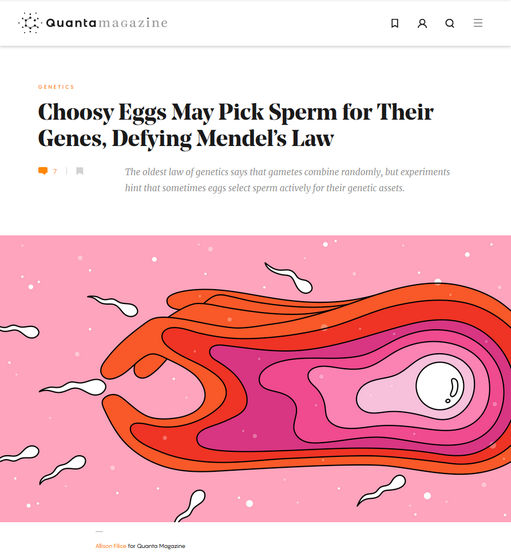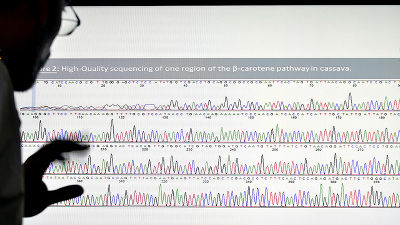Studies showing the possibility that fertilization of sperm and egg is not done randomly

byHannah Tasker
Up to now, it has been thought that which sperm are put into the ovum at the time of fertilization is random, and it has been thought that the egg is only waiting passively for the sperm to come, but by the researcher , It is shown that fertilization seems not to be random.
Do Gametes Woo? Evidence for Their Nonrandom Union at Fertilization | Genetics
http://www.genetics.org/content/207/2/369
Choosy Eggs May Pick Sperm for Their Genes, Defying Mendel's Law | Quanta Magazine
https://www.quantamagazine.org/choosy-eggs-may-pick-sperm-for-their-genes-defying-mendels-law-20171115/

If the fertilization is random and done randomly, the combination of genes of its descendants will be a specific ratio, which is Mendel'sLaw of separationIt is known as.Pacific Northwest Research InstituteofJoseph NadoDr. also says "The law of separation is one of the broadly applicable rules in biology", but if sperm and eggs can influence other sperm and eggs involved in fertilization in some way Then, this ratio may change.
Dr. Nador, who is engaged in research on heredity for a long time, focused on two specific genes (APOBEC 1 and DND 1) of mouse and found that interaction between two genes is one of hereditary cancers · How to testis cancer risk I investigated whether it has an effect. Dr. Nador and PhD doctor Jennifer Zechel first mated heterozygous mice (male) of APOBEC 1 with female mice with normal copies of DND 1 and mutated copies. Then, the mouse born with this mating followed Mendel's law. However, when the combination was exchanged, a heterozygous mouse (female) of APOBEC1 was crossed with a heterozygote (male) of DND1, only the mutant of APOBEC1, only the mutant of DND1, and the mouse having both mutants were 75% Where was supposed to be born, in fact only 27% was born.
Dr. Nador thought that the cause was in the sperm rather than the egg, continued the study and noticed genetic bias at fertilization. Dr. was already involved in the research as to whether this has already reached this point, but although we found many examples of "descendant unknown descendants" a lot, we pursued full-scale investigation of genetically biased fertilization There was hardly anything that was done.
Among them, it was a paper on "DDX 1" protein in the development of hereditary childhood cancer retinoblastoma. Dr. Roslene Godbaut of University of Alberta, who studied the research, found that the number of offspring of homozygotes was lower than predicted. Dr. Devon-Germain, a co-researcher of Dr. Godbaut who received an inquiry from Dr. Nador thought that it was a mysterious pattern of inheritance, but "fertilization is not random" It did not come to the idea that it was.
Some researchers agree with the view that "eggs are not only passive", but it has been pointed out that there is room for research on the possibility of "biasing" of fertilization, and Dr. Nador also I agree with that point.
Related Posts:
in Science, Posted by logc_nt







